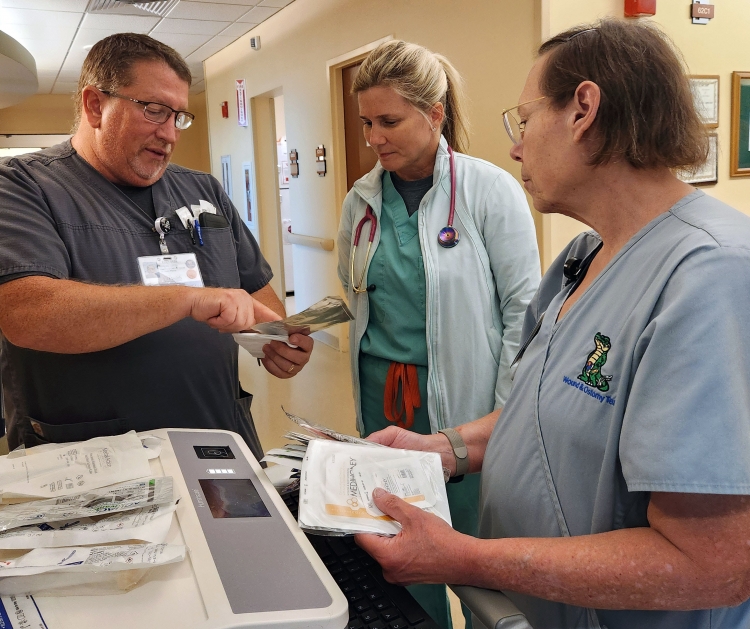UF nurses globally recognized for lifesaving wound care strategies
Left to right: Randy Brian, Sandra Citty and Cindy Westbrook pictured, looking over wound care products at UF Health Shands Hospital. The three were part of a research project funded by UF Health and the UF College of Nursing to study wound care treatments for ECMO sites that have saved lives. (Photo by Carlos Medina.)
University of Florida (UF) Health News
By Carlos Medina
Gainesville, Florida — In 2020, University of Florida (UF) Health Shands Hospital nurses Cindy Westbrook and Randy Brian used their wound care skills to help keep oxygen-rich blood flowing through the bodies of critically ill COVID-19 patients.
They were called after doctors and nurses noticed skin around oversized extracorporeal membrane oxygenation, or ECMO, tubes hooked into major blood vessels breaking down from bleeding, fluid buildup, or infection. The two wound care specialists, with the help of the entire health care team, treated the sites like advanced wounds, and it worked.
“We were addressing problems as they occurred and using every bit of our training and knowledge. Before the pandemic, we didn’t see these issues often because ECMO treatment was not as common,” Brian said.
Their work became part of a research project funded by UF Health and the UF College of Nursing that is drawing attention for its success in helping reduce complications from ECMO devices.
Later this month, they will present their findings at the 35th International Nursing Research Congress in Singapore. The congress draws hundreds of nurse researchers, students, clinicians, and leaders from around the globe.
ECMO devices are life-support machines that draw blood from the body, remove carbon dioxide, oxygenate red blood cells, and return it to the body. The devices allow patients’ lungs and hearts time to heal.
Before COVID-19, ECMO was used as few as 25 times a year at UF Health Shands and was often a “last-ditch effort,” said Sandra Citty, Ph.D., R.N., APRN-BC, a UF College of Nursing clinical associate professor who guided the research team.
“These are not regular IV tubes. The ECMO tubing is like a hose — probably a little smaller than a garden hose,” Citty said.
Doctors resorted to using ECMO routinely during the pandemic when traditional ventilators could not keep pace with COVID-19’s effects on some patients’ blood-oxygen levels.
Westbrook said she and Brian initially treated the sites with vacuum-assisted closure therapy, also known as wound VAC. Often used for large, deep wounds, the treatment uses negative pressure and helps wounds heal more quickly. The two became the go-to team for treating failing ECMO sites. But they soon focused on preventing problems using special wound dressings and preparations. By the time the pandemic eased, Westbrook and Brian had helped more than 200 patients.
After COVID-19, the use of ECMO increased worldwide and it is now commonly used in ICUs for heart and lung patients, Westbrook said.
When UF Health and the UF College of Nursing announced a second round of funding for research projects pitched by bedside nurses and paired with College of Nursing faculty, Brian and Westbrook pitched their work.
“Very few people in the country were doing what we were doing,” Westbrook said.
And the work of formalizing their three-step dressing system began in earnest.
“There was the chance to work with the University of Florida College of Nursing and somebody like Sandra Citty,” Brian said. “We jumped at the chance. Those opportunities are what change nursing.”
The team pored over more than 200 ECMO patient case histories and focused on wound VAC therapy results. The study showed ECMO patients who required wound VAC were significantly more likely to develop infection, erosion, and drainage at the tube-insertion site, as well as increased risk of pressure injury and multisystem organ failure.
“I think we learned a lot from the data, and there’s much more data for us to continue to study,” Brian said.
